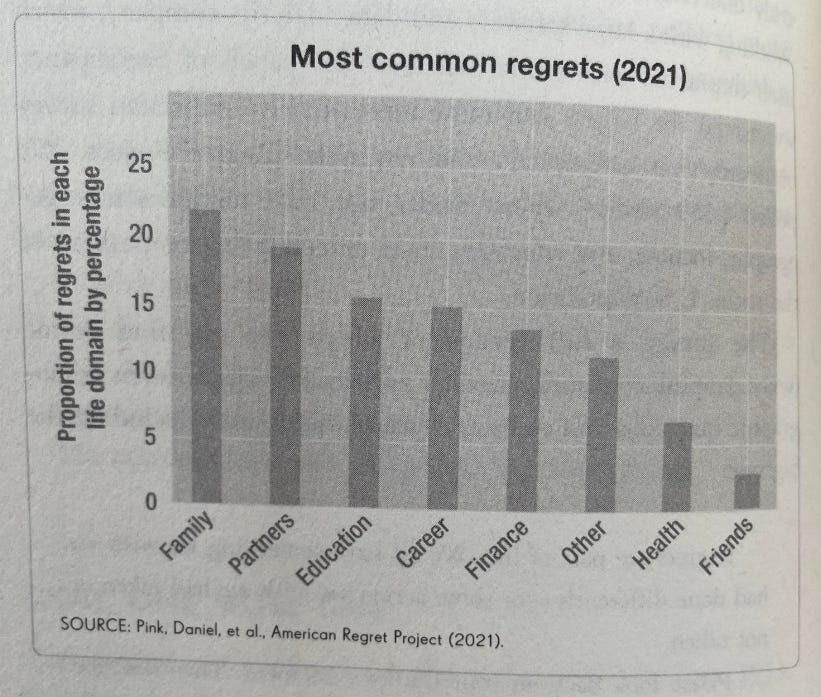Things Learned From…
The Power of Regret: How Looking Backward Moves Us Forward, by Daniel Pink
Daniel Pink did a study to determine people’s most common regrets on the surface:
But what he discovered is there are four deep structure categories of regret that cut across these surface categories.
The deep regret structure is more useful than the categories above.
The Four Core Regrets
Foundation regrets
The first deep structure category cuts across nearly all the surface categories.
Many of our education, finance, and health regrets are actually different outward expressions of the same core regret: our failure to be responsible, conscientious, or prudent.
Our lives require some basic level of stability.
Without a measure of physical well-being and material security, other goals become difficult to imagine and even harder to pursue.
Yet sometimes our individual choices undermine this long-term need.
We shirk in school and leave before we should. We overspend and undersave. We adopt unhealthy habits.
When such decisions eventually cause the platform of our lives to wobble, and our futures to not live up to our hopes, regret follows. […]
Foundation regrets sound like this: If only I’d done the work.
Boldness regrets
A stable platform for our lives is necessary, but not sufficient.
One of the most robust findings, in the academic research and my own, is that over time we are much more likely to regret the chances we didn’t take than the chances we did.
Again, the surface domain—whether the risk involved our education, our work, or our love lives—doesn’t matter much.
What haunts us is the inaction itself.
Forgone opportunities to leave our hometown or launch a business or chase a true love or see the world all linger in the same way. […]
Boldness regrets sound like this: If only I’d taken that risk.
Moral regrets
Most of us want to be good people.
Yet we often face choices that tempt us to take the low road.
When we travel that path, we don’t always feel bad immediately. (Rationalization is such a powerful mental weapon it should require a background check.)
But over time, these morally dubious decisions can gnaw at us.
And, once again, the realm in which they occur—deceiving a spouse, cheating on a test, swindling a business partner—is less significant than the act itself.
When we behave poorly, or compromise our belief in our own goodness, regret can build and then persist. […]
Moral regrets sound like this: If only I’d done the right thing.
Connection regrets
Our actions give our lives direction. But other people give those lives purpose.
A massive number of human regrets stem from our failure to recognize and honor this principle.
Fractured or unrealized relationships with spouses, partners, parents, children, siblings, friends, classmates, and colleagues constitute the largest deep structure category of regret.
Connection regrets arise any time we neglect the people who help establish our own sense of wholeness.
When those relationships fray or disappear or never develop, we feel an abiding loss. […]
Connection regrets sound like this: If only I’d reached out.
This book was great, and I’m going to reference it more in the future. I just needed to cite these four categories as a start.
Thanks for reading! Hope you have a great day.
#789
![The Power of Regret: How Looking Backward Moves Us Forward by [Daniel H. Pink] The Power of Regret: How Looking Backward Moves Us Forward by [Daniel H. Pink]](https://substackcdn.com/image/fetch/$s_!KuEK!,w_1456,c_limit,f_auto,q_auto:good,fl_progressive:steep/https%3A%2F%2Fbucketeer-e05bbc84-baa3-437e-9518-adb32be77984.s3.amazonaws.com%2Fpublic%2Fimages%2F24795ba9-2d6b-4160-9dc8-59141959407d_331x500.jpeg)
